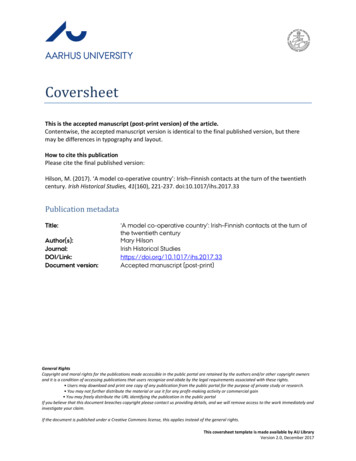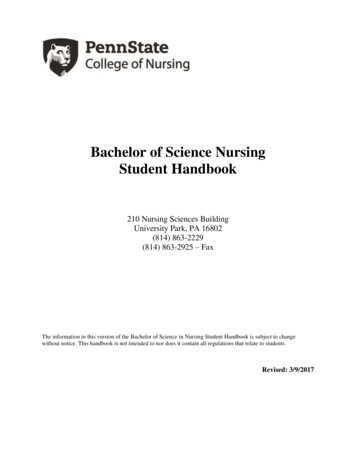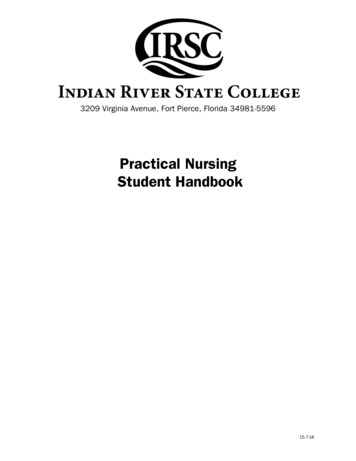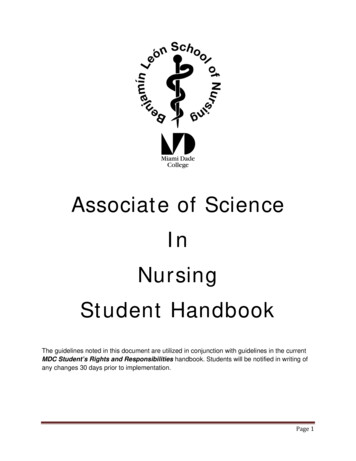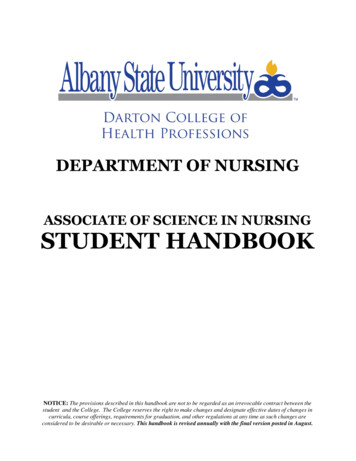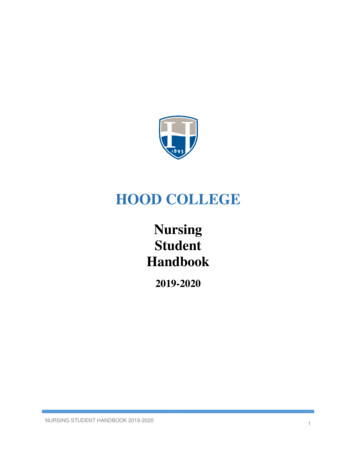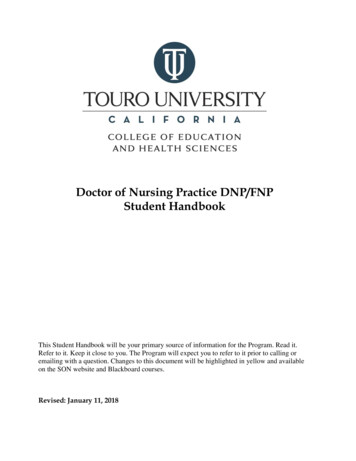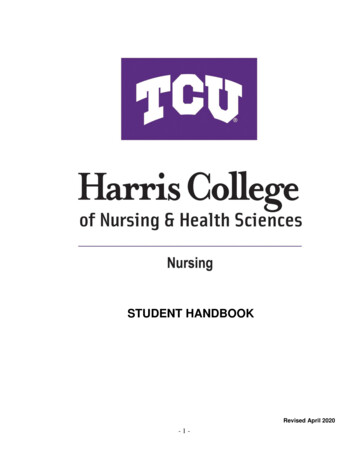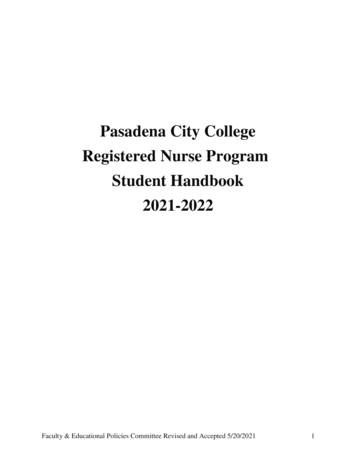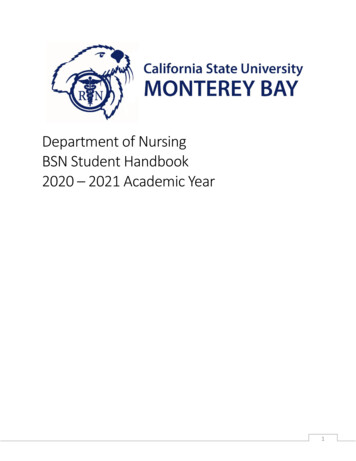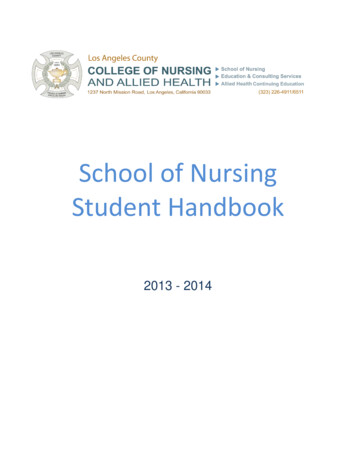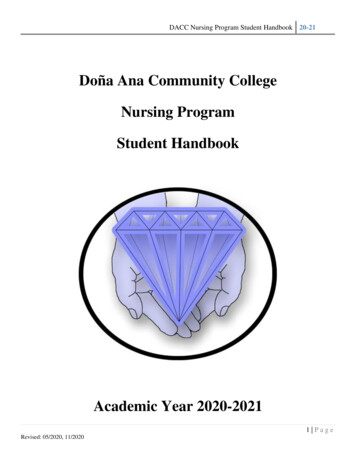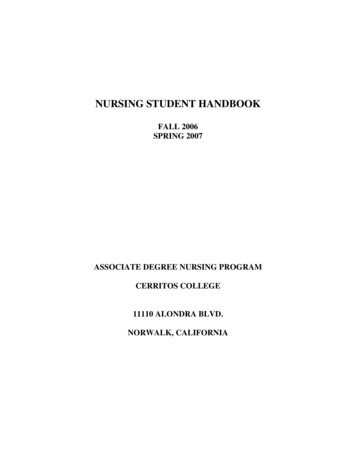
Transcription
NURSING STUDENT HANDBOOKFALL 2006SPRING 2007ASSOCIATE DEGREE NURSING PROGRAMCERRITOS COLLEGE11110 ALONDRA BLVD.NORWALK, CALIFORNIA
TABLE OF CONTENTSPAGEI.SCHOOL CALENDAR1II.ETHICAL CODES AND STANDARDS ESPOUSED BY THENURSING PROGRAM2-9AMERICAN NURSES ASSOCIATION CODE FOR NURSES2ETHICAL PRACTICES3STATEMENT OF HONESTY4BOARD OF REGISTERED NURSING SCOPE OFNURSING PRACTICE5-6BOARD OF REGISTERED NURSING STANDARDS OFCOMPETENT PRACTICE7BOARD OF REGISTERED NURSING POLICY STATEMENTON DENIAL OF LICENSURE8-9PHILOSOPHY AND OBJECTIVES10-21NURSING DEPARTMENT PHILOSOPHY AND CONCEPTUALFRAMEWORK10-11CURRICULUM OVERVIEW12-14ROLES OF THE ASSOCIATE DEGREE NURSE15-18LEVEL ONE OUTCOMES19TERMINAL OUTCOMES20CRITICAL CLINICAL COMPETENCIES21III.
IV.NURSING PROGRAM OPTIONS AND DEGREE REQUIREMENTS22-27OPTION AASSOCIATE IN ARTS DEGREE (Generic ADN)22OPTION BLPT-ADN MOBILITY PROGRAM23OPTION CLVN-ADN MOBILITY PROGRAM24OPTION DLVN-30 UNIT OPTION (Non-degree)24OPTION ETRANSFER25OPTION FBRN REFERRAL25GENERAL EDUCATION COURSE REQUIREMENTS26-27V.COURSE DESCRIPTIONS28-33VI.NURSING FACULTY AND HEALTH OCCUPATIONSDIVISION STAFF34-35RESOURCES AND FACILITIES36-43ADMISSIONS AND RECORDS36CAREER SERVICES CENTER36ASSOCIATED STUDENTS OF CERRITOS COLLEGE (ASCC)37BOOKSTORE37CHILD DEVELOPMENT CENTER37COUNSELING CENTER37DISABLED STUDENT PROGRAMS AND SERVICES37EXTENDED OPPORTUNITY PROGRAM AND SERVICES (EOPS)37FINANCIAL AID OFFICE38HEALTH INSURANCE38LEARNING RESOURCE CENTER38-39VII.
VIII.IX.NURSING SUPERVISED TUTORIAL SKILLS LAB39STUDENT HEALTH SERVICES AND WELLNESS CENTER39TRANSFER CENTER39APPROVED CLINICAL AGENCIES40-43STUDENT ROLE IN THE NURSING PROGRAM44-62STUDENT ROLE IN THE PROGRAM44STUDENT RIGHTS AND RESPONSIBILITIES45-47CLASS OFFICERS48-49PINNING CEREMONY GUIDELINES50-52NATIONAL STUDENT NURSES’ ASSOCIATION (NSNA)53STUDENT NURSES’ ASSOCIATION OF CERRITOSCOLLEGE (SNACC)54-60SNACC MISSION STATEMENT61-62NURSING PROGRAM POLICIES AND PROCEDURES63-98CLINICAL REQUIREMENTS63-64PHYSICAL REQUIREMENTS FOR CLINICALNURSING ROLE65CLINICAL ASSIGNMENT GUIDELINES66-70TESTING PROCEDURE71-73ATTENDANCE AND MAKE-UP POLICY74CELL PHONE/PAGER/BEEPER POLICY75LATE AND INCOMPLETE PAPERS76MEDICATION MATH PROFICIENCY77DIRECTIONS FOR MEDICATION MATH PROFICIENCYEXAMINATION78MEDICATION ERROR GUIDELINES79
X.GRADING GUIDELINES80-81ADVISEMENT NOTE GUIDELINES82-83ADVISEMENT NOTES84-85STUDENT DRESS CODE86-87STUDENT GUIDELINES FOR RESOLVING PROGRAMOR COURSE RELATED ISSUES88-89STUDENT GRIEVANCE PROCEDURE90SUBSTANCE ABUSE/PSYCHOLOGICAL IMPAIRMENTPOLICY AND PROCEDURE91-92GUIDELINES FOR WITHDRAWAL, DISMISSAL ANDREINSTATEMENT93-95ACCEPTABLE ABBREVIATIONS96-97UNAPPROVED ABBREVIATIONS98STUDENT ROLE IN NURSING PROGRAM EVALUATION99-104STUDENT ROLE IN PROGRAM EVALUATION AFTERPROGRAM COMPLETION99LECTURE COURSE EVALUATION100-101CLINICAL COURSE EVALUATION102-103SIGNATURE PAGE104TO BE SUBMITTED TO NURSING DEPARTMENT; DUE DATES ANNOUNCED BYINSTRUCTORS.
SCHOOL CALENDARFALL SEMESTER, 2006August 14Fall semester beginsAugust 14First day to file petition for A.A. Degree and Certificate for FallAugust 18Last day to drop to be eligible for refund for 1st nine-week classesSeptember 4Labor Day HolidaySeptember 29Last day to drop from 1st nine-week classes with a “W”October 13Last day to register for 2nd nine-week classesOctober 16Last day to file petition for A.A. Degree or Certificate for FallOctober 17Second nine-week session beginsOctober 20Last day to drop to be eligible for refund for 2nd nine-week classesNovember 10Veteran’s Day HolidayNovember 17Last day to drop from eighteen-week classes with a “W”November 23-26Thanksgiving HolidayDecember 1Pinning CeremonyDecember 1Last day to drop from 2nd nine-week classes with a “W”December 9-15Fall Semester ExamsDecember 15Fall Semester EndsWatch bulletin boards for announcements of other activities.Student Nurses’ Association of Cerritos College (SNACC) meets at 10 a.m. on the first Thursday ofeach month, room to be announced.Officer’s Council meets at 10 a.m. on the third Thursday of each month in SL 120.Student representatives are encouraged to attend all department meetings held on 3rd and 4thThursdays of each month, at 11 a.m. SLPA Lab.
SCHOOL CALENDARSPRING SEMESTER, 2007January 8Spring semester beginsJanuary 8First day to petition for A.A. Degree or Certificate for SpringJanuary 12Last day to drop to be eligible for refund for 1st nine-week classesJanuary 15Dr. Martin Luther King’s Holiday ObservanceFebruary 16Lincoln’s Birthday ObservanceFebruary 19Washington’s Birthday ObservanceFebruary 23Last day to withdraw with “W” from 1st nine-week classesMarch 5Last day to petition for May CommencementMarch 12Second nine-week session beginsMarch 16Last day to drop to be eligible for refund for 2nd nine-week classesMarch 16Last day to register for 2nd nine-week classesApril 2Last day to file petition for A.A. Degree or Certificate for SpringApril 2-8Spring RecessApril 27Pinning CeremonyMay 11Last day to withdraw with “W” from 2nd nine-week classesMay 12-18Spring Semester ExamsMay 12CommencementMay 18Spring Semester EndsWatch bulletin boards for announcements of other activities.Officer’s Council meets at 10 a.m. on the second Thursday of each month, in SL 120. Studentrepresentatives are welcome to attend all department meetings (held on 3rd and 4th Thursdays ofeach month, at 11 a.m. in SLPA Lab).
ETHICAL CODES AND STANDARDSESPOUSED BY THE NURSING PROGRAM
AMERICAN NURSES ASSOCIATIONCODE OF ETHICS FOR NURSESThe Nursing Program offers you this code as a guideline for your practice in the profession which you are preparingto enter.The nursing profession works with other health care groups to promote health, alleviate suffering and attaintherapeutic goals based upon human need.Each nurse has the responsibility to individuals, sick or well, their families, and the public. Such responsibilityrequires ethical practices and adherence to the laws relevant to nursing.1.The nurse, in all professional relationships, practices with compassion and respectfor the inherentdignity, worth and uniqueness of every individual, unrestricted byconsiderations of social or economicstatus, personal attributes, or the nature of healthproblems.2.The nurse’s primary commitment is to the patient, whether an individual, family, group, or community.3.The nurse promotes, advocates for, and strives to protect the health, safety, and rightsof the patient.4.The nurse is responsible and accountable for individual nursing practice anddetermines theappropriate delegation of tasks consistent with the nurse’sobligation to provide optimum patient care.5.The nurse owes the same duties to self as to others, including the responsibility toand safety, to maintain competence, and to continue personal andprofessional growth.preserve integrity6.The nurse participates in establishing, maintaining, and improving healthcareenvironments andconditions of employment conducive to the provision of quality health care and consistent with the values of theprofessional through individual andcollective action.7.The nurse participates in the advancement of the profession through contributionseducation, administration, and knowledge development.to practice,8.The nurse collaborates with other health professionals and the public in promotingnational, and international efforts to meet health needs.community,9.The profession of nursing, as represented by associations and their members, is responsible forarticulating nursing values, for maintaining the integrity of the profession and its practice, and for shaping socialpolicy.Revised 10/96, 4/04
NURSING DEPARTMENT ETHICAL PRACTICESThe Nursing Department applies the ANA Code for Nurses and principles of ethical practices ineducation through the following practices:1.All recruitment activities are objective and present accurate and unambiguousinformation. Literature (e.g. brochures and admission procedures) is available forreview in the Nursing Department.2.The Cerritos College General Catalog contains current information regarding thenursing program. Information packets are available in the Nursing andCounseling Departments and may be requested by mail.3.The Refund Policy for fees and tuition is printed in the Cerritos College GeneralCatalog.4.All aspects of the Civil Rights Act are adhered to and grievance policies arepublished in the Cerritos College Student Handbook.5.All confidential information is handled appropriately by clerical and instructionalstaff.6.The Cerritos College General Catalog and the Nursing Student Handbook statethe policies regarding promotion, graduation and dismissal. All students haveaccess to a grievance procedure which is consistent with the college grievanceprocedure described in the Cerritos College Student Handbook.7.All students who meet the graduation requirements of Cerritos College and theNursing Program are granted permission to graduate and apply for the licensingexamination.8.Ethical practices for nursing as stated in the A.N.A. Code for Nurses areincorporated into the Cerritos College Nursing Program.9.Tutorial and remedial services are available through the College Academic Support Center. Creditby Examination is available to all students (see Nursing Student Handbook, Cerritos CollegeGeneral Catalog, Cerritos College Student Handbook, and course schedules). All applicants areconsidered on an individual basis and every effort is made to evaluate all course workappropriately.Adopted: 11/89Revised: 10/96Reviewed: 04/04
NURSING DEPARTMENT STATEMENT ON HONESTYAs described on the following pages, the California Board of Registered Nursing may deny licensure forcrimes or acts substantially related to nursing qualifications. Grounds for denial of license include: Being convicted of a crime substantially related to the practice of nursing; including: child abuse;sexual abuse, misconduct or relations with a patient; conviction as a mentally disordered sex offender;act or crime involving sale, gift, administration or furnishing of narcotics or dangerous drugs ordangerous devices; and assault and/or battery.Any act involving dishonesty, fraud or deceit with intent to substantially benefit self or another, orsubstantially injure another. This includes violations of exam security, impersonating another personin an examination, insurance fraud, and falsifying records.Any act which is grounds for suspension or revocation of a registered nurse’s license. This includesviolating any provisions of the Nursing Practice Act.The Cerritos College Nursing Faculty believe that these behaviors are inconsistent with safe nursingpractice and reserve the right to dismiss from the nursing program any student who demonstrates evidenceof the above-described behaviors. This includes plagiarism, cheating on examinations, giving falseinformation on any college, department or clinical agency document and any act of dishonesty in theclassroom or clinical setting.Approved: 11/89Revised: 1/97Reviewed: 4/04
BOARD OF REGISTERED NURSINGPOLICY STATEMENT ON DENIAL OF LICENSUREThe California Board of Registered nursing protects the public by screening applicants for licensure in order toidentify potentially unsafe practitioners. Statutory authority for denial of licensure is specified in Business andProfessions Code, Sections 480-487, 492, 493, 496, 810, 820-828, 2750-2765, and 2795-2797.The law provides for denial of licensure for crimes or acts which are substantially related to nursing qualifications,functions or duties. A crime or act meets this criterion if, to a substantial degree, it evidences present or potentialunfitness to perform nursing functions in a manner consistent with the public health, safety or welfare (CaliforniaCode of Regulations, Section 1444).The Board may deny licensure on the basis of: Conviction of a crime substantially related to the practice of nursing. Any act involving dishonesty, fraud or deceit with intent to substantially benefit self or another or tosubstantially injure another. Any act which is grounds for revocation of a license. Making a false statement on the application for license. Breach of examination security.POLICY ON CONVICTIONS:The Board considers most convictions involving sex crimes, drug crimes and crimes of violence to be substantiallyrelated to nursing practice. Board regulations list examples of such crimes or acts to include, but not to be limitedto: Conviction of child abuse Violation of Nursing Practice Act Conviction as a mentally disordered sex offender Crime or act involving narcotics, dangerous drugs or dangerous devices Conviction of assault and/or batteryPOLICY ON REHABILITATIONIf the Board determines that an act or crime is substantially related to the practice of nursing, it is then theresponsibility of the applicant for licensure to present sufficient evidence of rehabilitation.When considering denial of licensure, the Board uses the following criteria to evaluate whether the applicantdemonstrates rehabilitation. Nature and severity of the acts or crimes. Additional subsequent acts. Recency of acts or crimes. Compliance with terms of parole, probation, restitution, or other sanctions. Evidence of rehabilitation submitted by the applicant.These regulations apply to applications for interim permits and temporary licenses as well as to permanent licenses.Applicants for licensure are required under law to report all misdemeanor and felony convictions, even ifthey have been expunged. Failure to report prior convictions or disciplinary action against other healthprovider licenses is considered falsification of application and is grounds for denial of licensure orrevocation of license.
When reporting prior convictions or disciplinary action, applicants are required to provide a fullwritten explanation of the following: circumstances surrounding the arrest(s), conviction(s), and/ordisciplinary action(s); the date of the incident(s), conviction(s), or disciplinary action(s); specificviolation(s), citing section of law if convicted, court location or jurisdiction, sanctions or penaltiesimposed, and completion dates.The Board of Registered Nursing has developed the following list of suggested evidence of rehabilitationfor applicants whose licensure is in question. At the time of licensure, the burden of proof lies with theapplicant to demonstrate sufficient competent evidence of rehabilitation to establish fitness to performnursing functions in a manner consistent with public health, safety and welfare. These items should bemailed directly to the Board of Registered Nursing, Licensing Unit, P.O. Box 944210, Sacramento, CA94244-2100.1. Copies of court documents pertinent to conviction, including documents specifying conviction andsanctions and proof of completion of sanctions.2. Letter from applicant describing the underlying circumstances of arrest and conviction as well as anyrehabilitation efforts or changes in life since that time to prevent future problems.3. Letters of reference on official letterhead from nursing program instructors concerning attendance,participation and performance in the nursing program.4. Letters of reference on official letterhead from past and/or current employers.5. Letters from recognized recovery programs and/or counselors attesting to current sobriety and lengthof time of sobriety if there has been a history of alcohol or drug abuse.6. Proof of community work, schooling and self-improvement efforts.7. If relevant, a current mental status examination by a clinical psychologist or psychiatrist. Thisevaluation should address the likelihood of similar acts or convictions in the future, and shouldaddress the evaluator’s perception of the applicant’s suitability for the registered nursing profession.8. Copy of Certificate of Rehabilitation or evidence of expungement proceedings.9. Evidence of compliance with and completion of terms of probation, parole, restitution, or any othersanctions.Any student who wishes additional information or to discuss the mater further is encouraged to contactDr. Fobi. Appointments may be made for calling (562) 860-2451 extension 2551. Students areencouraged to begin the process of collecting documents as soon as possible to avoid delay in licensure atprogram completion.Revised 12/99, 4/04
PHILOSOPHY AND OBJECTIVES
NURSING DEPARTMENT PHILOSOPHY AND CONCEPTUAL FRAMEWORKPHILOSOPHYNursing is defined as a science, discipline and health care practice that focuses on the assessment,diagnosis and treatment of clients having health problems within the domain of nursing. The goals ofnursing practice focus on health promotion, illness prevention, rehabilitation, and supporting the resourcesof the person who is ill or threatened with illness in adapting to changes within the environment.In addition to implementing the philosophy of the College, the purpose of the Nursing Program isto provide the community with registered nurses who are capable of functioning in a variety of health caresettings. To accomplish this, the Roy Adaptation Model has been selected as the primary conceptualframework. Within this framework, nurses recognize their clients as biopsychosocial beings in constantinteraction with the environment. In periods of health, individuals have both innate and learnedbehavioral mechanisms which enable them to cope with their complex internal and external environments.In times of stress, the client’s coping mechanisms may be disrupted and the individual is defined as ill.The client’s health status is defined on a continuum from wellness to illness.Nursing practice focuses on adaptation of the client in four major modes: physiological, selfconcept, role function, and interdependence. The program prepares students to understand individuals astotal beings and to recognize and respect a diversity of spiritual and cultural/ethnic values.ROLE OF THE ASSOCIATE DEGREE NURSEThe Associate Degree Nurse (ADN) graduate is prepared to function as a provider of care,manager of care and member of the discipline of nursing. As provider of care, the ADN utilizes thenursing process as a basis for decisions regarding delivery of care. As manager of care, the ADNcollaborates with other health care providers in organization and delegation of care. As a member of thediscipline of nursing, the graduate is committed to professional growth, continuous learning and selfdevelopment. In fulfilling these roles, the ADN graduate utilizes critical thinking, demonstrates clinicalcompetence, and is accountable and committed to the value of caring.Nursing graduates are employed in a health care delivery system that continues to grow andchange. The Associate Degree Nurse is an entry level practitioner and is competent to practice as a directcaregiver in a variety of structured settings which include diverse client populations. ADN graduates maysubsequently pursue bachelors, masters and doctoral degrees in preparation for advanced levels ofpractice.
CONCEPT OF EDUCATIONNursing faculty believe that nursing education is driven by the application of critical thinking anddevelopment/improvement of teaching/learning strategies using innovative approaches and evidencebased research. Nursing faculty also believe that the purpose of education is to enlighten and enhance thequality of life for the student, the community and clients for whom students and graduates provide care.Education based on mastery learning is viewed by nursing faculty as a collaborative process involvingcollege administrators and staff, nursing faculty and nursing students. Each student enters the nursingprogram with unique characteristics, capabilities, learning styles, and motivation for learning. To addressthese individual differences, learning experiences are structured from simple to complex.The goal of the program is to promote students’ creative and critical thinking and personal growthbased on successful learning experiences. Achievement of this goal is fostered by encou
The Cerritos College Nursing Faculty believe that these behaviors are inconsistent with safe nursing practice and reserve the right to dismiss from the nursing program any student who demonstrates e
